The 20th Presidential Elections of South Korea is revealing itself with the presidential primaries of all the parliamentary parties complete. With the upcoming elections, the young generation is gaining the people’s attention. As addressed in the previous volume of The UOS Times, the younger generation, also called Generation MZ (Gen MZ), have certain distinct characteristics when compared to the older generations. One of the most evident characteristics is their indifference toward politics. The UOS Times carried out in-depth research on Gen MZ and their attitudes toward politics.
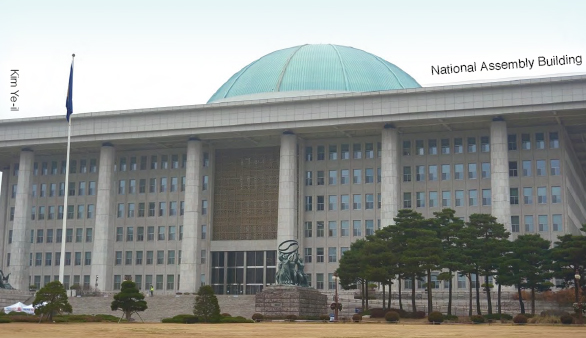
The UOS Times conducted a survey to investigate the extent to which the students of the University of Seoul (UOS) pay attention to politics and what they think of the 20th Presidential Elections. Less than 30 percent of the respondents replied positively to the question, “Do you believe that South Korea’s Gen MZ are interested in politics?” Over half the respondents answered that Gen MZ are not enthusiastic but show some interest. The answers can be interpreted as reflecting indifference on the whole.
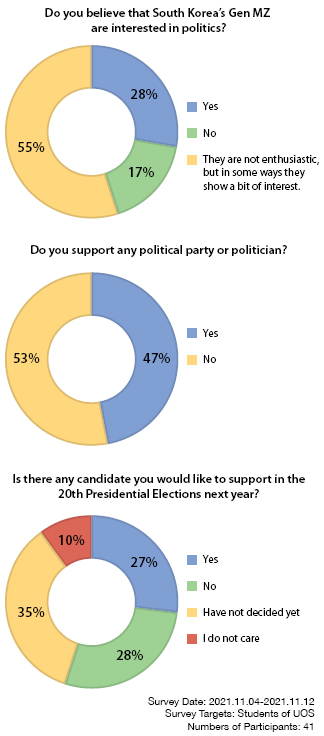
Many of the respondents did not seem to have any parties or politicians to support; it can mean that there are no candidates or political parties that represent their interests well. Over 60 percent of the students said so; of these, 28 percent did not like to support any of the candidates in the 20th Presidential Elections, and 35 percent were yet to decide which candidate to support, as shown in charts. Further, 10 percent did not care about the elections at all.
Why are Gen MZ indifferent toward politics?
The UOS Times went deeper and deduced why Gen MZ seem indifferent toward politics. The biggest reason is the decrease in political anticipation, which is the tendency of the people to expect politicians to drive society to a better condition. South Korea, a stratocracy in the 1980s and before, underwent unprecedentedly rapid democratization. Therefore, the political anticipation of people born in the 1980s and before remained strong. However, this is not the case for people born after the 1990s, that is, those who are in their early twenties and below. They spent their childhood against the backdrop of relatively stable politics. They did not have a chance to encounter a serious nationwide political issue like the June Struggle. Therefore, they have neither experienced the impact that politicians have on society nor have felt the need to participate in politics.
The second reason is the increase in political distrust that the younger generation has been experiencing. One of the Gen MZ’s characteristics is the tendency to seek fairness. However, the political events that Gen MZ have witnessed involved corruption and untrustworthiness. There are numerous cases ranging from the dissolution of The Unified Progressive Party that was accused of supporting the North Korean regime to the impeachment of ex-president Park Geun-hye caused by the unconstitutional abuse of authority of the president herself and her entourage. As Gen MZ do not believe that politicians work for the benefit of the country and the public, but rather for their own benefit, they mistrust politics itself and have decided to withdraw from participating in it.
The third reason is the influence of Internet culture. Gen MZ are also known as “Digital Natives.” Being accustomed to Internet activities has caused them to participate in politics not through conventional, but rather alternative methods, such as social media and online national petitions. Online activities are not taken seriously in established politics and have not been quantitatively measured yet, as both have been introduced only recently. Thus, Gen MZ seem less enthusiastic about politics.
However, some also argue that Gen MZ are not indifferent to politics, but rather that established politicians and conventional governmental powers exclude Gen MZ from participating. Gen MZ have developed their own method to speak for themselves. Although they have considerable interest in politics, the current political system in South Korea is yet to adapt to the new mode of conveying political voices. The evidence of Gen MZ being interested in politics can be found in voter turnout statistics.
Over the two last elections that were held to elect the members of the National Assembly and the mayor of Seoul and Busan, the voter turnout among Gen MZ was remarkably higher than that among those aged in their 30s. Among those aged under 40 years, the highest voter turnout was from those aged 18 and 19 years, namely the youngest legal age to vote. Finally, whereas the number of voters decreased among those aged in their 50s and 60s in the last two elections, there was an increase in the number of voters aged under 30 years. Thus, Gen MZ have not lost interest in politics.
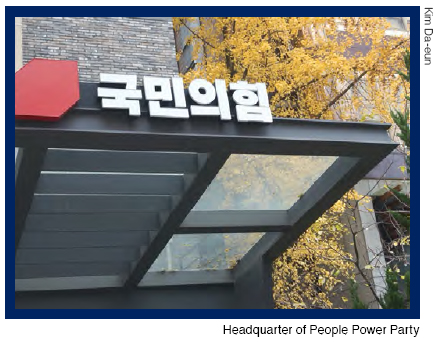
Some analyses have shown that “political engineering” has influenced politicians to minoritize young people. Political engineering is the art of calculating people’s votes and determining the best actions to maximize the votes for themselves. Owing to the decrease in birth rates in South Korea, which began in the 1990s, young people are least in numbers whereas “Baby Boomers” constitute the largest population segment. Therefore, to get the most votes possible, politicians focus on the voices and benefits of seniors rather than those of Gen MZ. Although Gen MZ may have presented its willingness to participate in politics, politicians do not consider it reasonable to reflect their voices and arguments.
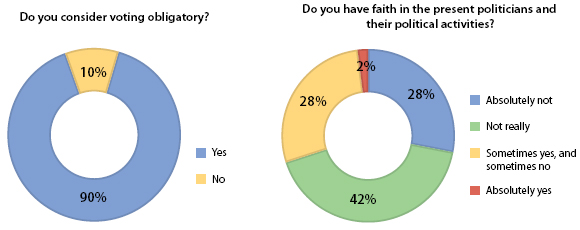
Possible Problems Caused by Indifference among Gen MZ towards Politics
If the indifference of Gen MZ continues in South Korean society, there may be many problems. For example, the needs of people in their twenties may not be reflected in the political scenario. This means that the status or problems of Gen MZ will not be reflected in policymaking processes and society at large. This isolation can enhance the indifference toward politics of Gen MZ. This will weaken the independence of the youth, as political decisions will be made by the older generation alone. The more Gen MZ refrain from participating in political activities, the less their needs are addressed in society.
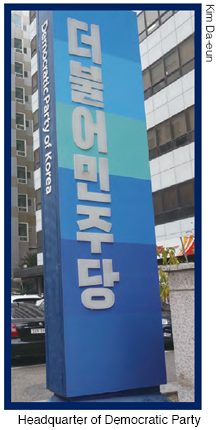
In the survey that The UOS Times conducted, 90 percent of the respondents replied that “Voting is mandatory for all.” However, the majority answered “No” in response to the question, “Do you have faith in the present politicians and their political activities?” These results show that the youth are aware of their responsibility to participate in political activities, but there is a definite difference in reliability in politicians and political environment. This is one of the most serious problems because the gap between generations can lead to a misunderstanding that may cause inter-generational conflicts. In a diverse society like that of today, communication is important in order to reflect various social groups’ needs with respect to political activities. However, if one generation refuses to communicate with another, it would remain excluded.
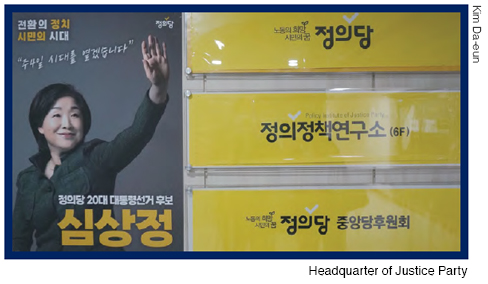
Attempts to Make Young People Participate in Politics
To prevent the problems mentioned above and make young people pay attention to politics, efforts on part of both the younger and older generations are necessary. Established politicians and governmental powers do not ignore the voice of Gen MZ altogether. Young people are the driving force of South Korea’s political future. The system of proportional representation is doing its work now. For instance, the Justice Party prioritizes its younger members among its proportional representatives. Starting in 2020, the party decided to allocate at least 20 percent of the seats they earned in election for members aged 35 years or younger. Ryu Ho-jeong, a member of the Justice Party and one of the members of the National Assembly, was elected by proportional representation. She now represents the Gen MZ’s needs in the National Assembly at the age of 29 years. This is also the case with People Power Party (PPP), which elected Lee Jun-seok, a young politician aged 36 years, as its first party leader. As many as 44 percent of PPP members considered him a representative of the younger voices in the party, he became the youngest party leader ever since the Constitution was established. Thanks to this system, more politicians from younger age groups can represent Gen MZ as members of the National Assembly.
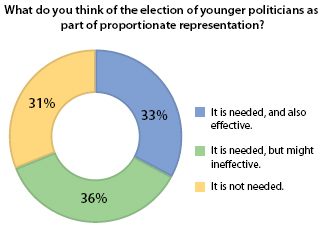
However, there are concerns that political parties may use this just to get more votes from Gen MZ. The voice of Gen MZ may not be represented sufficiently. Most respondents think that the system of proportional representation is necessary. However, there are mixed views on its effectiveness: 33 percent of the respondents consider it effective, whereas 35 percent consider it ineffective, and 30 percent think that the system is neither necessary nor effective.
Irrespective of whether such efforts are needed and effective, it is true that existing political parties are trying to communicate with the younger generation by giving them more political opportunities. Gen MZ should respond to enable better implementation.
The responses in the survey may not represent Gen MZ in entirety as the respondents are exclusively from UOS. Paying attention to the political situation is more than necessary for all generations, especially because the 20th Presidential Elections, which is one of the biggest elections to members of a society, are coming up in March 2022. The party candidates are about to begin their election campaigns.

The students of UOS have expressed their needs in response to the question, “What do you want the 20th President to do?” As university students, some want the president to solve youth unemployment and offer them more jobs. Other students want the present to increase the level of punishment for criminal acts and to lower real estate prices so that they may have their own homes, as the property prices in South Korea are prohibitive. Based on all these points, the youth need somebody who can well-represent them. They should pick a person who can respond to and address their needs. This is applicable to every generation in Korea. As a member of society, each citizen should keep an eye on the candidate list and the political situations.
Gen MZ will take on the heavy responsibility of leading the future of South Korea. To choose and support particular candidates of parties, Gen MZ should see politics subjectively; by searching for valid information on the current politics in South Korea. By learning about the political environment and society where they are members, they can develop their political values and conviction on their own. Provided so, they can exercise their vote to express their expectations of the political system.
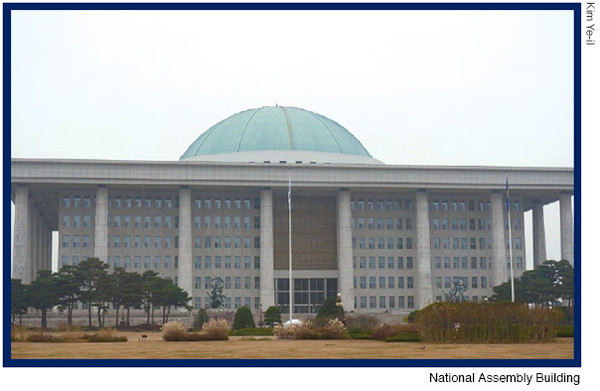
Kim Da-eun
daeunkim749@uos.ac.kr
Kim Ye-il
lavieenrose0705@uos.ac.kr

